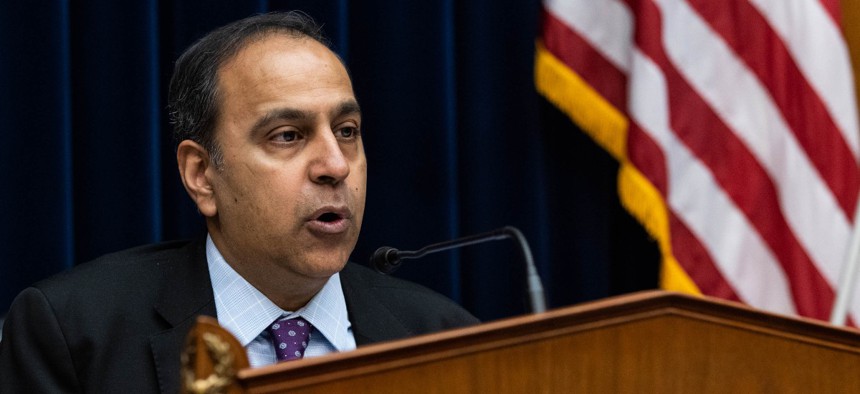House Lawmaker Asks 9 Entities to Illuminate Crypto’s Security Concerns

House Oversight and Reform Committee Chairman Raja Krishnamoorthi speaks during a House Oversight and Reform Committee hearing on sexual harassment in the workplace at the Washington Football Team, on February 3, 2022 in Washington, DC. Graeme Jennings-Pool/Getty Images
Rep. Raja Krishnamoorthi issued nine letters to regulatory agencies and crypto trading platforms alike asking for future plans, emphasizing consumer protections.
Leadership at the Subcommittee on Economic and Consumer Policy sent formal letters to both public agencies and private sector companies in the crypto industry asking for more information around cryptocurrency and digital currency-related fraud, as more Americans participate in the growing economic sector.
Chairman Rep. Raja Krishnamoorthi, D-Ill., sent some of these letters to U.S. agencies, including the Department of Treasury, Securities and Exchange Commission, Commodity Futures Trading Commission, and Federal Trade Commission.
On the private sector side, Krishnamoorthi sent letters to digital asset exchanges Bianance.US, Coinbase, FTX, Kraken and KuCoin requesting detail on governing policies for buying and selling digital currencies, cybersecurity protocols, consumer protections and plans to take more stringent action to combat financial scams.
“Insufficient security measures likewise leave users exposed to the outright theft of assets stored on the exchange,” the letter to Coinbase read. “Many exchanges have also failed to implement appropriate monitoring of accounts, which can flag illicit activity, notify investors and prevent transactions with addresses linked to scammers.”
Public sector organizations, namely the Treasury, are asked primarily about forthcoming policy developments to regulate the industry and relevant framework developments, as well as a timeline for implementation.
“As stories of skyrocketing prices and overnight riches have attracted both professional and amateur investors to cryptocurrencies, scammers have cashed in. The lack of a central authority to flag suspicious transactions in many situations, the irreversibility of transactions and the limited understanding many consumers and investors have of the underlying technology make cryptocurrency a preferred transaction method for scammers,” wrote Krishnamoorthi. “For all these reasons, I am concerned about the growth of fraud and consumer abuse linked to cryptocurrencies.”
A slew of lawmakers have taken the initiative to inquire about preventative measures within cryptocurrency companies as well as regulatory agencies. Senator Elizabeth Warren, D-Mass., was one of the more recent lawmakers to introduce legislation that would impose regulation over the volatile and popular market.
Aside from formal legislation, Congress has also conducted various hearings surrounding the cryptocurrency industry and asked for perspectives around the industry’s broad security.
One recent hearing discussed the inherent security of blockchain technology, and how more regulations can work in favor of private sector crypto companies.






